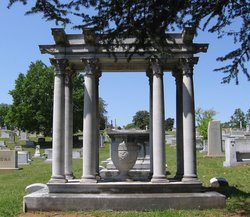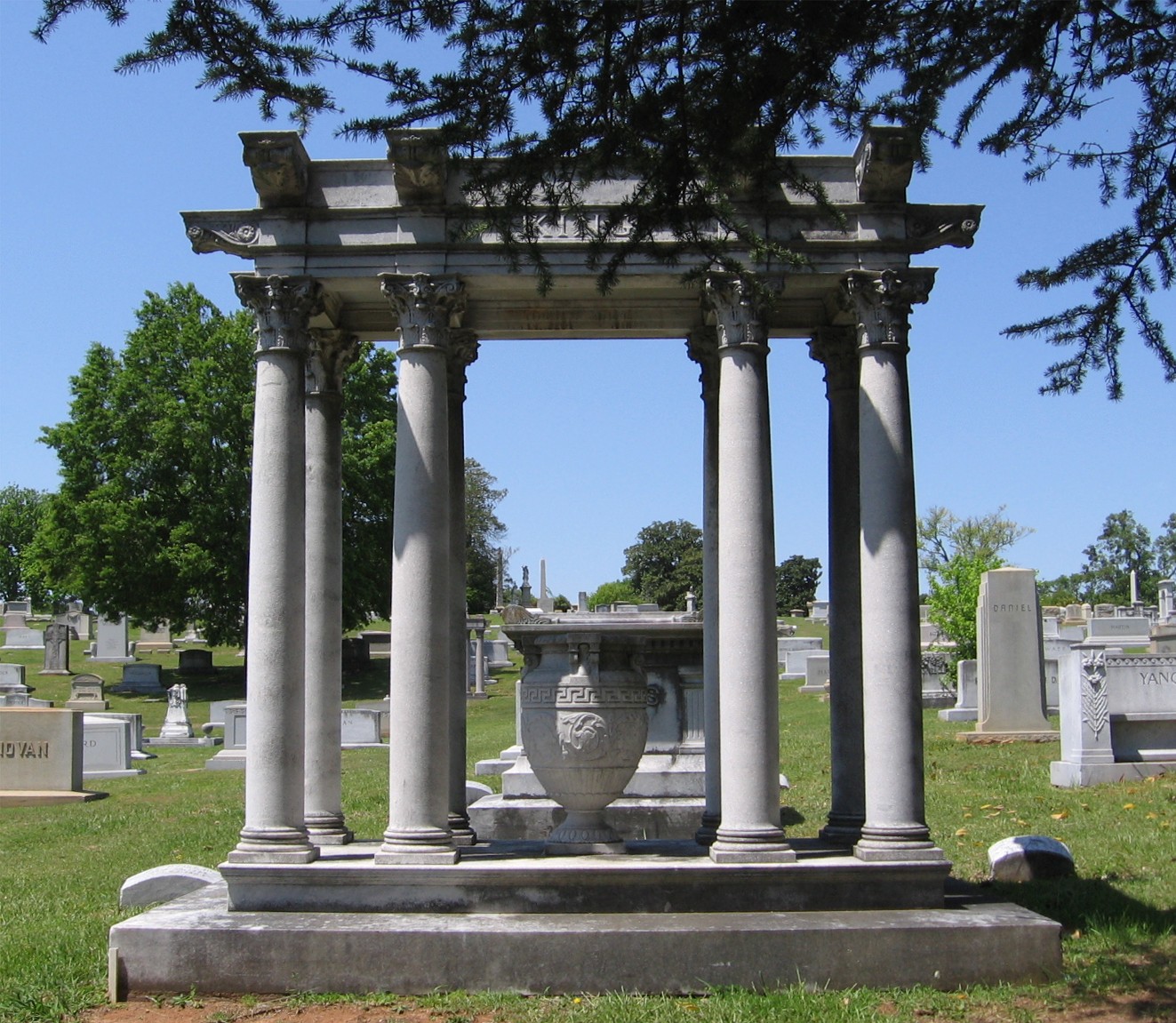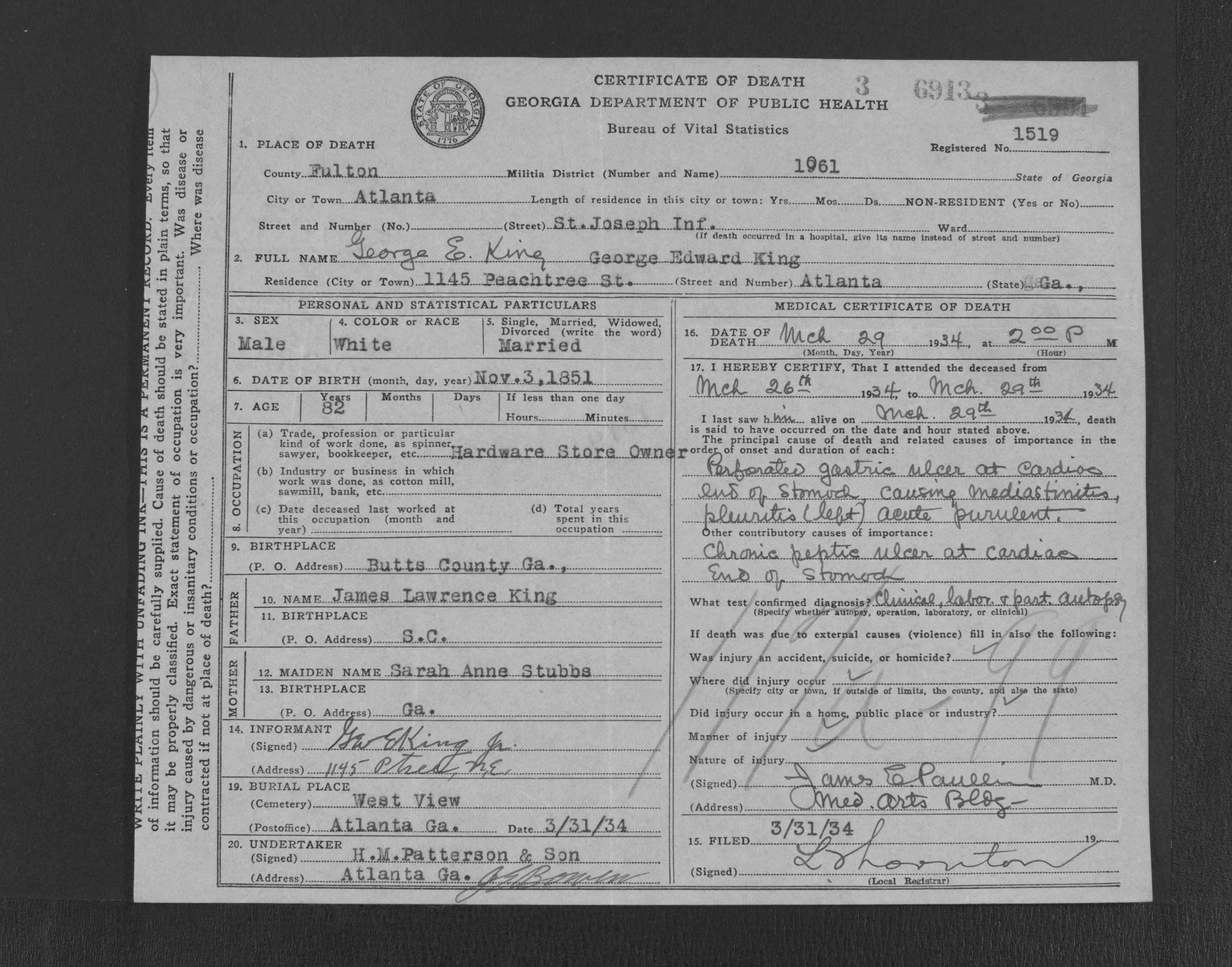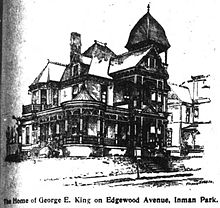Son of James Lawrence King, Sr. and Sarah Ann Stubbs.
Husband of Ida S. Simmons King.
George E. King, then a frail but energetic young man who traveled for Matthai Ingram & Company, metalware makers of Baltimore, came to Atlanta in 1882 with a view of invest- ing his savings in a hardware business. What happened then is told in a booklet issued by the company, and follows:
"At that time there was a population of about 40,000 in the city and there were three great hardware houses in Atlanta, headed by three great men (for they grew giants in the hardware business in those days, and while these older giants are now gone, other younger ones have taken their places).
"This young man had traveled over a number of states and selected his native state and the city of Atlanta as the best place to cast his lot in the hardware field. Perhaps if he had had more sense and more judgment he would never have undertaken such a hard job in such a small city where there was such great competition.
"The total amount of capital raised was $9,500. Only those who have tried to find a suitable stand for business in any city will realize what a task confronted this young man. He found one vacant store, but it was on the wrong side of the street, and success or failure lies on the side of the street you may select. Just opposite this vacant store was a retail grocer who did not seem any too prosperous. After questioning this man, and after spending two or three days in bargaining, he took over the unexpired lease on this two-story building, giv- ing the grocer more than 10 per cent of the capital named above, as a bonus. The building was located at the southeast corner of Peachtree and Wheat streets (now Auburn ave- nue), the upper floor being occupied by five or six doctors. These offices greatly reduced the rent.
Company Opens.
"Thus the firm of George E. King & Company was launched, and thus began the struggle of momentous import for its founder. The firm occupied the first floor and the basement but their meager capital hardly furnished enough merchandise to fill up the first floor at the front, and in the rear of the store empty boxes were carefully placed so as to make it appear that we had large reserve stocks unopened.
"The next door neighbor at that ime was Asa G. Candler, who afterward made a great fortune and became a great philanthropist, giving
away many millions of dollars for churches, hospitals and colleges.
"George E. King & Company had the honor of selling Mr. Candler the first kettle (holding 50 gallons), to be used in making Coca-Cola.
"Later on, when the firm became more prosperous, Mr. Candler used to tell a joke, saying that an inquisitive old man had come into the [hardware] store in the early history of its existence and had poked his cane around on the stacks of empty boxes and came very nearly being crushed as they tumbled over. This did not actually happen but worse things did.
"One old gentleman came in, asked see the manager and when the to manager appeared he wanted to know why this place had been selected for any business. He was told that it seemed to be suited for a small hardware store. The man said, "Well, don't you know that this is known as "unlucky corner" and don't you know that every concern that has ever occupied this store has gone bankrupt?
Other Killjoys Appear.
"Many other consoling friends had remarks to make about the foolishness of opening up such a small business in competition with the other big stores. The beginning was not encouraging nor happy, and at the end of the first year it looked as if the Job's Comforters' knew what they were talking about, for the little store had lost $1,839, or about 20 per cent of its capital.
"The result of the second year's business showed a profit of $2,000. but the struggle had just begun and Mr. King felt that he would give his very life rather than have the business go down. He was at the store at 7 o'clock in the morning and stayed until 11 o'clock at night. It required just this kind of consistent work to make the business go. In the meantime the struggle had become so great that his weight was reduced from 145 pounds to 117. The third, fourth and fifth years showed steady im- provement, both as to sales and as to net profit, and in 1887 the King Hardware Company was organized with a capital of $20,000. This seemed such a large amount of money that in securing the charter we asked for no privilege of enlarging our capital, as it seemed that $20,000 would be sufficient for all time for our needs, but in a short time we had to ask for the privilege of increasing the capital and so the business went on growing year by year in volume and in progress, with scarcely a break in our payments of dividends, which have amounted to nearly one million five hundred thousand dollars, without impairing our growing capital.
Excerpt from The Atlanta Constitution, Thursday, September 29, 1932
Son of James Lawrence King, Sr. and Sarah Ann Stubbs.
Husband of Ida S. Simmons King.
George E. King, then a frail but energetic young man who traveled for Matthai Ingram & Company, metalware makers of Baltimore, came to Atlanta in 1882 with a view of invest- ing his savings in a hardware business. What happened then is told in a booklet issued by the company, and follows:
"At that time there was a population of about 40,000 in the city and there were three great hardware houses in Atlanta, headed by three great men (for they grew giants in the hardware business in those days, and while these older giants are now gone, other younger ones have taken their places).
"This young man had traveled over a number of states and selected his native state and the city of Atlanta as the best place to cast his lot in the hardware field. Perhaps if he had had more sense and more judgment he would never have undertaken such a hard job in such a small city where there was such great competition.
"The total amount of capital raised was $9,500. Only those who have tried to find a suitable stand for business in any city will realize what a task confronted this young man. He found one vacant store, but it was on the wrong side of the street, and success or failure lies on the side of the street you may select. Just opposite this vacant store was a retail grocer who did not seem any too prosperous. After questioning this man, and after spending two or three days in bargaining, he took over the unexpired lease on this two-story building, giv- ing the grocer more than 10 per cent of the capital named above, as a bonus. The building was located at the southeast corner of Peachtree and Wheat streets (now Auburn ave- nue), the upper floor being occupied by five or six doctors. These offices greatly reduced the rent.
Company Opens.
"Thus the firm of George E. King & Company was launched, and thus began the struggle of momentous import for its founder. The firm occupied the first floor and the basement but their meager capital hardly furnished enough merchandise to fill up the first floor at the front, and in the rear of the store empty boxes were carefully placed so as to make it appear that we had large reserve stocks unopened.
"The next door neighbor at that ime was Asa G. Candler, who afterward made a great fortune and became a great philanthropist, giving
away many millions of dollars for churches, hospitals and colleges.
"George E. King & Company had the honor of selling Mr. Candler the first kettle (holding 50 gallons), to be used in making Coca-Cola.
"Later on, when the firm became more prosperous, Mr. Candler used to tell a joke, saying that an inquisitive old man had come into the [hardware] store in the early history of its existence and had poked his cane around on the stacks of empty boxes and came very nearly being crushed as they tumbled over. This did not actually happen but worse things did.
"One old gentleman came in, asked see the manager and when the to manager appeared he wanted to know why this place had been selected for any business. He was told that it seemed to be suited for a small hardware store. The man said, "Well, don't you know that this is known as "unlucky corner" and don't you know that every concern that has ever occupied this store has gone bankrupt?
Other Killjoys Appear.
"Many other consoling friends had remarks to make about the foolishness of opening up such a small business in competition with the other big stores. The beginning was not encouraging nor happy, and at the end of the first year it looked as if the Job's Comforters' knew what they were talking about, for the little store had lost $1,839, or about 20 per cent of its capital.
"The result of the second year's business showed a profit of $2,000. but the struggle had just begun and Mr. King felt that he would give his very life rather than have the business go down. He was at the store at 7 o'clock in the morning and stayed until 11 o'clock at night. It required just this kind of consistent work to make the business go. In the meantime the struggle had become so great that his weight was reduced from 145 pounds to 117. The third, fourth and fifth years showed steady im- provement, both as to sales and as to net profit, and in 1887 the King Hardware Company was organized with a capital of $20,000. This seemed such a large amount of money that in securing the charter we asked for no privilege of enlarging our capital, as it seemed that $20,000 would be sufficient for all time for our needs, but in a short time we had to ask for the privilege of increasing the capital and so the business went on growing year by year in volume and in progress, with scarcely a break in our payments of dividends, which have amounted to nearly one million five hundred thousand dollars, without impairing our growing capital.
Excerpt from The Atlanta Constitution, Thursday, September 29, 1932
Family Members
Sponsored by Ancestry
Advertisement
Records on Ancestry
Advertisement























